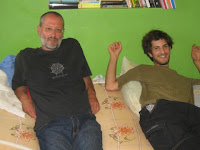I recently got home for my visit to Palestine-Israel. Here are some of the things I learned or experienced:
1) Many Palestinian activists think that armed confrontation used in the 2nd Intifada was counterproductive and unsuccessful. In that confrontation a small group of armed fighters put the struggle on Israeli terms and sidelined mass participation. These activists believe that a better long term strategy is non-violent civil disobedience and resistance. This form of struggle can include great numbers of Palestinians plus Israelis and Internationals in joint action.
2) Within the Occupied Territories there are signs of a sectarian (Fatah) PA. There is sometimes an unwillingness to engage in open political debate. In the business world this can be caused by fear of offending the existing authorities and what they can do in response. For example, authorities might not renew a business or operating license.
3) An important feature of the new strategy is that it promotes discussion, debate and democracy. These are essential since it is not just a question of getting rid of the Occupation; the question is what will follow.
4) Conditions in the West Bank are generally safe for visitors. The big majority of people are friendly even when they know you are American. It helps to say "Bush Very Bad". This almost always breaks the ice and promotes a big smile or handshake!
5) There no saints. A few taxi drivers will try to cheat you in Bethlehem as well as New York or Vancouver.
6) Old city Jerusalem is one of the wonders of the world. But be prepared for some very hard sell tactics in the markets.
7) Israelis are joining Palestinians at the front lines of the mass non violent resistance. At Umm Salamun I saw three get arrested (along with three Palestinians). At Bilin I was worried for the safety of one brave Israeli.
8) At the demonstrations Muslim Palestinians join together with Christian Palestinians and internationals with ease.
9) Its the policy, stupid! I met a Canadian Israeli woman who lives in Maale Adummim. She would prefer to live in joint Arab-Jewish community. However now she is a 'settler'. Why? She has new condo for $200K that would cost $1 Million in Jerusalem. There are parks and public facilities all over. Property taxes are a fraction what they would be elsewhere. Israeli policy is to take over more and more land using economic incentives where the religious or ethnic zealotry does not work.
10) On the surface Bethlehem looks pretty comfortable. Below that it is struggling badly. The economic infrastructure throughout the West Bank is in dire straits. Despite taking HIGHER taxes from the Palestinians Israel invested almost nothing into West Bank or Gaza infrastructure.
11) All Palestinians are upset at the Fatah-Hamas infighting. Fatah supporters are in denial over evidence of Israeli-US support for Fatah 'Executive Force' and aggression.
12) The extent and pervasiveness of Israeli settlements, checkpoints, restricted roads and overall Occupation is disturbing. How would YOU like to be prevented from travelling outside your town (or across town)?
13) The conflict is over land and resources not religion.
14) It will take robust INTERNATIONAL PRESSURE to bring peace to this conflict. The Palestinians do not have enough people or resources to challenge Israel militarily. Try as hard as it can, Israel cannot vanquish the Palestinians. The balance of forces are such that international intervention is essential. That means it is essential for progressives in the US to bring about a change in US policy.
15) Palestine Summer Encounter is a good program. We met with many terrific individuals and organizations.


















